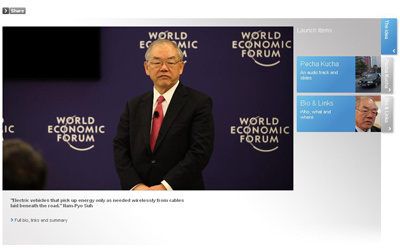The World Economic Forum (WEF) recently introduced KAIST’s “Electric Vehicles” and “Next Generation of Biomaterials” on the IdeasLab homepage. IdeasLab is a unique format presented at WEF meetings around the world. In each IdeasLab, representative members of the world’s top academic institutions discuss their current research results and ideas with their audience and colleagues.

KAIST was invited by WEF last year to deliver presentations on its main research subjects. President Nam Pyo Suh and Professor Sang Yup Lee, Dean of the College of Life Science and Bioengineering, traveled to Tianjin, China last September and attended WEF’s Summer Davos Forum.
During the forum, President Suh emphasized the necessity of employing electric vehicles to achieve sustainable growth. He then introduced KAIST’s “Electric Vehicles,” a pioneering work that no longer requires bulky batteries to be installed on electric automobiles. Instead, KAIST’s “Electric Vehicles” receive power wirelessly from cables buried underground.
In addition, Professor Lee elaborated on Bio Refinery, a technique that incorporates engineered high-performance microorganisms to produce useful chemicals from non-food renewable biomass. Professor Lee claimed that Bio Refinery will serve as a solution to the potential future energy crisis caused by fossil fuel depletion.
According to a member of the Office of Planning and Budget at KAIST, WEF’s featuring of KAIST’s major research projects provides an opportunity for Korea’s science and technology research to gain further prestige.
“WEF is a gathering of VIPs who both directly and indirectly influence the world’s policies,” said Professor Lee. He also commented that “the fact that WEF selected sustainable bio-based chemical processing as a core industry for green growth has very important implications.”

